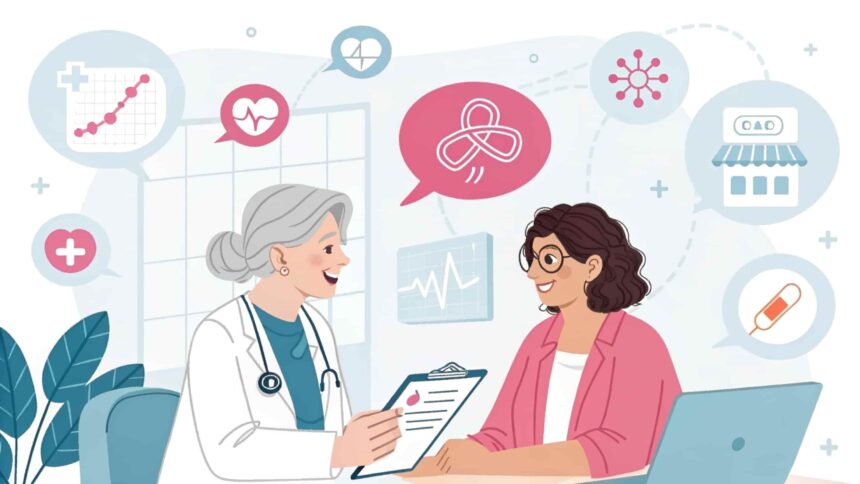Women’s health screenings are essential tools for early detection and prevention of serious medical conditions. These tests can identify risks before symptoms even appear, enabling timely treatment and improved long-term health. From reproductive wellness to chronic diseases, several key screenings should be part of every woman’s healthcare plan.
Pap Smear and HPV Test
Pap smears detect abnormal cervical cells that can lead to cervical cancer. Women should start screening at age 21.
- Ages 21–29: Pap smear every 3 years
- Ages 30–65: Pap + HPV test every 5 years or Pap alone every 3 years
Early detection can prevent cervical cancer from developing or catch it at a treatable stage.
Mammogram for Breast Cancer
A mammogram is an X-ray of the breast used to detect tumors before they’re felt.
- Women 40–49: Begin optional yearly screening based on risk
- Women 50–74: Recommended every 1–2 years
Those with a family history may start earlier. Mammograms are vital for catching cancer early when it’s most curable.
Blood Pressure Screening
High blood pressure often shows no symptoms but increases risk for stroke, heart disease, and kidney issues.
- Starting at age 18: Get checked at least every 2 years
- If readings are high: Monitor more frequently
Regular tracking helps maintain cardiovascular health.
Cholesterol Test
This blood test measures levels of LDL (bad), HDL (good), and total cholesterol.
- Begin testing at age 20
- Repeat every 4–6 years, or more often if at risk
Managing cholesterol early helps prevent heart disease.
Blood Sugar and Diabetes Screening
High blood sugar may indicate prediabetes or type 2 diabetes.
- Screen starting at age 35
- Earlier if overweight or family history exists
Tests include fasting glucose and A1C. Lifestyle changes can reverse prediabetes if caught early.
Bone Density Test
A DEXA scan checks for osteoporosis, especially important after menopause.
- Women 65 and older: Test every 2 years
- Younger if risk factors like early menopause, low weight, or fractures are present
It helps prevent life-altering bone fractures through early treatment.
Colon Cancer Screening
This screening detects polyps and colon cancer.
- Start at age 45
- Continue through age 75
Options include colonoscopy every 10 years or stool-based tests more frequently.
Skin Cancer Checks
Regular skin exams detect early signs of melanoma and other cancers.
- Self-checks monthly for new moles or changes
- Full-body skin exam by a doctor annually or as advised
Sun exposure increases skin cancer risk, so early detection is critical.
Sexually Transmitted Infection (STI) Screenings
Screening for STIs like chlamydia, gonorrhea, and HIV is crucial for sexually active women.
- Under age 25: Annual screening recommended
- Over 25: If high risk or new partners
STI testing helps protect fertility and prevent transmission.
Thyroid Function Test
The thyroid gland regulates metabolism, mood, and energy.
- Test if symptoms of fatigue, weight change, or irregular periods exist
- Recommended especially after age 60 or postpartum
Simple blood tests like TSH can detect hypothyroidism or hyperthyroidism.
Eye and Vision Screening
Eye health can decline with age or health conditions like diabetes.
- Every 2 years after age 40
- Annually if diabetic or with a family history of eye disease
Screening helps detect glaucoma, cataracts, and vision loss.
Hearing Test
Hearing loss is subtle and often untreated.
- Begin screening by age 50
- Repeat every 10 years, or sooner if symptoms appear
Early detection supports better communication and cognitive function.
Dental Checkups
Oral health affects digestion, heart health, and more.
- Recommended every 6 months
- Exams include cleaning, cavity checks, and gum disease evaluation
Good oral hygiene starts with routine dental visits.
Mental Health Screening
Women are at higher risk of anxiety and depression.
- Screening should be part of annual wellness exams
- Discuss mood, stress, and sleep patterns with your provider
Addressing mental health early promotes emotional well-being.
Reproductive Health Exams
Annual pelvic exams check the uterus, ovaries, and vaginal health.
- Especially important for those with menstrual issues or pain
- Also useful for birth control discussions and pre-pregnancy planning
It ensures overall reproductive system monitoring.
Liver Function Tests
The liver helps detoxify the body.
- Screen if on medications, overweight, or drink alcohol regularly
- Periodic tests detect hepatitis or fatty liver disease early
Monitoring liver health supports metabolism and immune function.
Conclusion
Health screenings empower women to take charge of their well-being. From early adulthood through older age, different tests become relevant at different stages of life. Regular exams allow for prevention, early diagnosis, and effective treatment of many conditions. Consult your healthcare provider to create a personalized screening schedule that fits your age, history, and risk factors.
FAQs
What screenings should women get annually?
Pap smear, blood pressure check, STI testing (if sexually active), breast exam, and mental health screening are often recommended yearly.
When should women begin mammograms?
Typically between ages 40–50 depending on personal and family risk. Continue every 1–2 years thereafter.
Are blood tests required every year?
Not always, but blood sugar and cholesterol testing should be done every few years, or annually if risk factors exist.
Is a Pap smear still needed after age 65?
Possibly not, if you’ve had consistently normal results. Discuss this with your doctor.
Can screenings prevent disease?
Yes. Screenings catch problems early, often before symptoms start, allowing for treatment that prevents progression.











